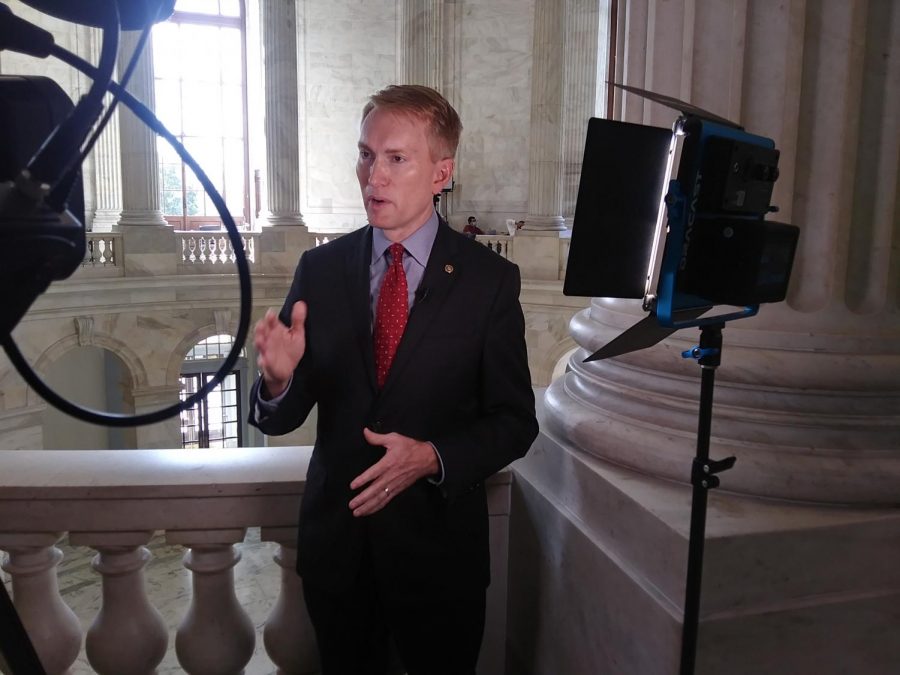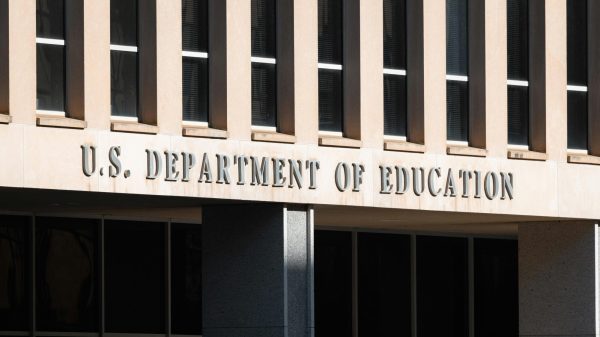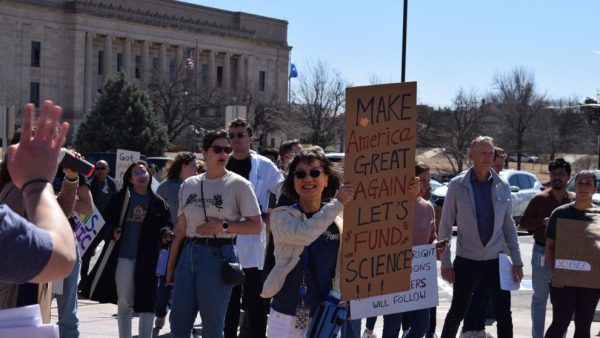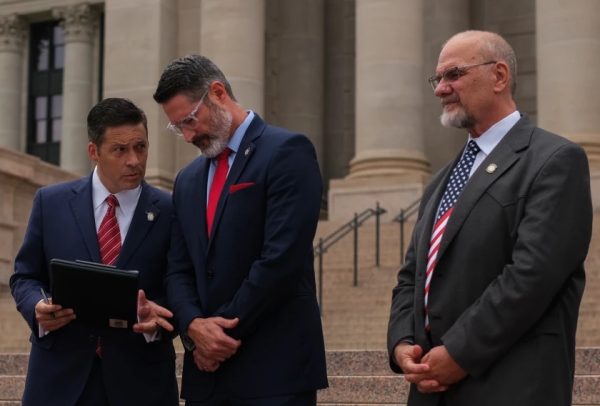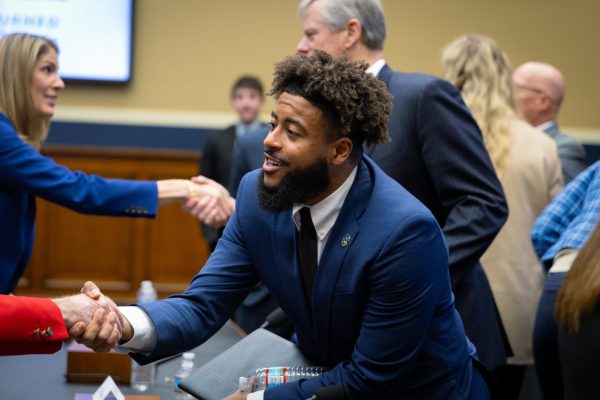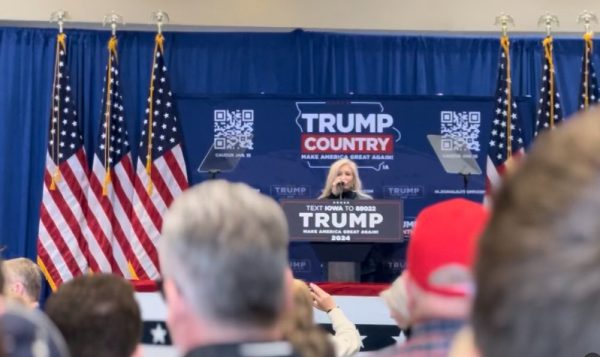SCOTUS confirmation battle, stimulus stalemate highlight partisan divide
Oklahoma Sen. James Lankford talks with reporters about Supreme Court Justice nominee Amy Coney Barrett and stimulus negotiations. Gaylord News / Jessie Christopher Smith.
WASHINGTON — As President Donald Trump’s Supreme Court nominee was confirmed Monday night, Oklahoma’s two senators pinned the blame on Democrats as coronavirus relief negotiations stalled yet again.
Sens. James Lankford and Jim Inhofe criticized Senate Democrats for what they said were unfair attempts at mischaracterizing Judge Amy Coney Barrett’s religious beliefs, as well as blocking what they said were “common sense efforts” to provide coronavirus relief to Americans.
“There were several issues not covered in her hearing, but there was a lot of political posturing,” Lankford said, referring to contentious Senate confirmation hearings for the week of Oct. 12 during which Democrats grilled Barrett on healthcare and abortion. “She’s extremely well-qualified for this, and her judicial philosophy lines up very well with, ‘What does the law say? I’m going to stick with the law.’”
Monday night the Senate voted 52-48 to confirm Barrett, with only Sen. Susan Collins (R-Maine), who faces a tough re-election there, voting no on the Republican side.
Barrett’s confirmation battle has unfolded alongside strained negotiations regarding another coronavirus relief package, which have consistently fallen short since summertime.
Inhofe said that Senate Democrats had taken “unprecedented actions to slander, delay and block” Barrett’s confirmation.
“Instead of treating nominees with respect, Democrats have set the precedent of filibustering highly qualified nominees simply because they are appointed by a Republican president,” Inhofe said. “Judge Barrett is inspiring and confirming her will be one of the truly great accomplishments to come out of the Trump administration.”
Lankford said he was stunned by his Democratic colleagues’ attempts to “make Americans afraid of this mother of seven” as if she were anti-healthcare, anti-woman, or racist.
“They kept coming back to, ‘Where are you on Brown v. Board of Education’?” Lankford said, referring to the landmark 1954 Supreme Court decision that desegregated schools. “That is the ultimate dog whistle, to say that this person is secretly a racist segregationist.”
Democratic members of the Senate Judiciary Committee boycotted Thursday’s vote of approval to send Barrett’s nomination to the full Senate, as Barrett’s confirmation to the court will secure a 6-3 conservative majority. After a rare weekend session full of debate, the Senate voted 52-48 for confirmation Monday evening, with Barrett to be sworn in later.
“She’s moved about as quickly through the process as Ruth Bader Ginsburg did when she had her nomination as well,” Lankford said.
Justice Ginsburg’s death on Sept. 18 set off a high-stakes partisan battle over filling the vacant seat in the weeks before the presidential election, and Democrats have argued that the passage of a coronavirus relief stimulus package should take priority over a replacement of Ginsburg before Nov. 3.
“We can definitely do two things at once,” Lankford said. “The 22 members of the Judiciary Committee walking through that process doesn’t distract the ongoing work of COVID relief.”
Last week, Senate Republicans did not secure enough votes for a $500 billion package including unemployment benefits and small business aid. A separate Republican $500 billion proposal to extend forgivable small business loans under the Paycheck Protection Program did not advance, either.
“Democrats need to wake up and start working for the American people instead of against them,” Sen. Inhofe said, emphasizing the need to assist educators, healthcare professionals, small business owners and farmers.
“Republicans have shown we are ready to come to the table,” he said. “I wish I could say the same for my counterparts across the aisle.”
Since summer, negotiations have been ongoing between House Speaker Nancy Pelosi, D-Md., and Treasury Secretary Steve Mnuchin, with estimates for the current stimulus bill ranging from $1.8 trillion to $2.3 trillion. Both reiterated last week they were optimistic about a compromise but have yet to strike up a deal.
“We’ve made lots of progress in lots of areas, but there’s still some significant differences that we’re working on,” Mnuchin said.
“It’s not just a question of us agreeing in a room,” Pelosi said. “It takes time. I do believe that both sides want to reach an agreement. I can’t answer for the disarray on the Senate side.”
The last time a stimulus package was signed into law was the $2 trillion CARES Act in March, which provided $300 billion of one-time payment checks to working families and single adults, along with temporary extended unemployment benefits and a small loan program to keep various businesses afloat.
An additional $3 trillion coronavirus relief bill called the HEROES Act passed the Democratic-majority House in May, but Senate Majority Leader Mitch McConnell refused to even consider the “unrealistic” and expensive package.
“They had a lot of things in their bill that were actually not COVID relief, or that were pretending we’re in the same spot that we were in March,” Lankford said, adding that with a large percent of the American workforce back in some type of employment, he believed a trillion dollar stimulus was not necessary.
“Let’s do what we have to do to get through this, but not more than we have to do,” he said.
Gaylord News is a reporting project of the University of Oklahoma Gaylord College of Journalism and Mass Communication.

is a journalism major at the University of Oklahoma, with minors in Religious Studies and English, Literary and Cultural Studies. He was co-founder and editor of Rap Chronicle, an online music magazine that published between fall of 2014 of and spring of 2017. His other bylines can be found in NonDoc, The Norman Transcript, and OU Daily. Jessie has worked his way through college as a crew member/server at Norman restaurants. He reported in Washington D.C. during the 2020 presidential election on behalf of Gaylord News.


